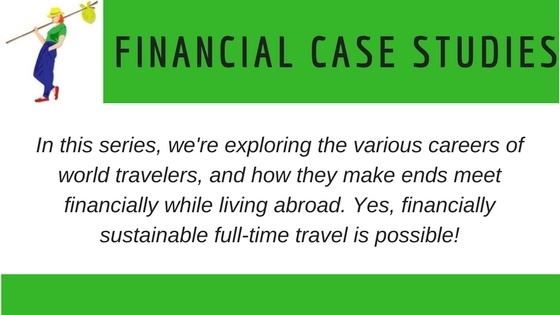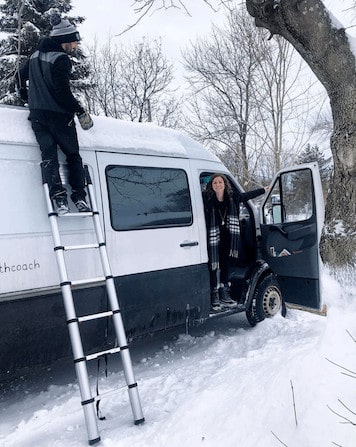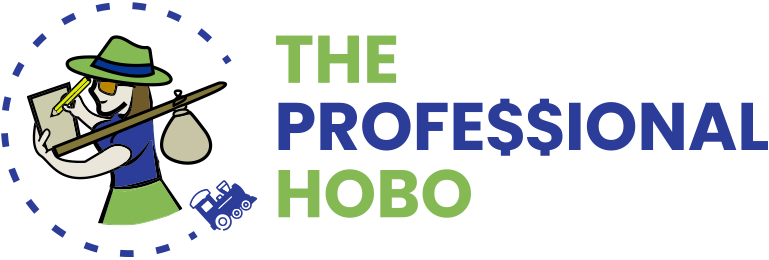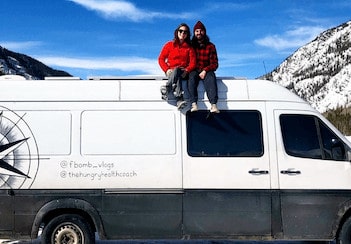Alex Napoli is a healthy lifestyle advocate (The Hungry Health Coach), trained health coach and yoga instructor. Frankie McCullough is an outdoor adventure enthusiast and vlogger with a world record in snowboarding. Together they are van lifers, living in Lolo, their built-out Sprinter van, while they create weekly vlogs about living on the road. Enjoy this financial case study about the lifestyle and careers of these adventurous van lifers as they get their online businesses off the ground while taking the world by storm.

How long have you been living/working on the road, and where have you traveled to?
Frankie and I left New York City on December 27th 2019 and have been full time in Lolo (our van) ever since. Right now, our first goal on this adventure was to set a world record for most mountains snowboarded in a single season. To accomplish that we traveled all over the United States and Canada. By the end of the record attempt we’ll have visited 71 mountains across North America. (Editor’s note: Unfortunately they had to put their world record attempt on hold with the coronavirus outbreak.)
Please describe what you do for income and how much you earn.
Together Frankie and I saved $24,000 over one year before setting off on this adventure. I manage the FnA Van Life YouTube channel and Hungry Health Coach website that generates roughly $200 a month in ad revenue. I also have an ebook available on Amazon that earns roughly $40 a month.
Frankie is working on building his YouTube channel (That Van Guy) but it’s not monetized as of yet. Between our savings and earnings from digital content, we’re quite comfortable.
(See also: How to Create a Long-Term Travel Budget, and how much money to save)
How many hours per week do you work on average?
Many. We spend at least a few hours everyday editing videos, promoting videos on social media, reaching out to media, writing another book and of course “creating content” by living life. At this point it feels like our whole lives are simultaneously work and play. Building an online business that can fund our dreams is a full time job.
How much money do you make?
Before leaving New York, both Frankie and I were making just shy of $100,000 a year. We were able to save aggressively while building out our van Lolo. When we started this journey I was making less than $50 a month from online content. Since sharing our travels on social media that number has jumped to over $200 a month. Hopefully this trend continues and we continue to build our following and income as we go.
What are your monthly costs on the road?
Because we bought an older van, we are constantly having to spend money to fix her up. Since leaving we’ve spent over $800 on various engine repairs. We’ve also been driving like crazy trying to make our world record and have spent over $1,700 on fuel in just two months. Without these inflated expenses, our monthly budget would sit at roughly $900 per month for food, cell phone, health insurance, gym and other miscellaneous expenses.
How much did it cost you to build out your van?
We bought our van for $4,000 and then spent just over $2,000 updating the engine. The actual build cost us roughly $7,500.
Do you make enough money to support your lifestyle?
No. Both Frankie and I were lucky to have great jobs in NYC before hitting the road. We both have investments in the stock market and high interest savings accounts. Between our savings, investment income and revenue from our online digital content, we’re very comfortable.

What do you like most about your career and lifestyle?
We love the freedom of being on the road, getting to see new and beautiful places every day. Yes, we’re working all the time and it can sometimes feel overwhelming. But we’re so happy to be doing work we love, sharing experiences that are meaningful to us. The thing we love the most is that we’ve given up our hour plus commute in New York city to endless hours of driving through the most beautiful landscapes on the planet. We feel blessed every day.
What are some of the challenges you have with this career and lifestyle?
It’s hard to get used to sleeping in strange parking lots and not knowing where your next shower is coming from. The many uncertainties of this lifestyle were at first very overwhelming for me in particular as I worked though my anxieties. It’s hard to go from a very structured life to one with no structure at all. I’ve had to work on creating my own routines and daily habits that help me feel grounded and calm even when the world is changing outside out windows daily.
What is your vision for the future of your lifestyle on the road?
Our original plan was to live in Lolo for a year, explore Canada and the US, and decide where we want to lay down roots. Now that we’ve been on the road for a while, we’re both feeling like this is something we’d like to continue doing as long as possible. Now we’re looking towards two years, more countries and finding new ways of generating income so we can extend this lifestyle as long as possible.
Any advice for the aspiring traveler about living and working on the road as van lifers and managing finances?
Lay a strong foundation while you’re still comfortable in your current life. Save as much money as possible, build your home without going into debt. You want to come into van life with as little overhead expenses as possible. While on the road, make time for work but also make time to play. You set off on this adventure to experience the world, don’t forget to enjoy that!
Is there anything else you’d like to add?
Frankie and I are reformulating all our plans now with the outbreak of covid-19. Our world record attempt is on hold, our travels are at a standstill, we hope that everyone is making good choices and helping to slow the curve. Van lifers especially need to make sure they aren’t transporting the virus from state to state. We’re taking every precaution and we hope you are too.
We’ve decided the best thing we can do in this time when mobility is limited is to move to a farm and help with the daily operations. We’re excited for this new challenge, to learn new skills, and to help out a small family farm while their normal workflow is disrupted.


